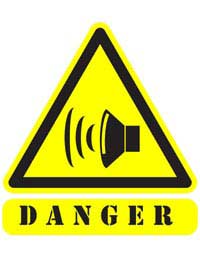Drugs to Prevent Noise-induced Hearing Loss

Being exposed to a very loud noise can induce so much damage to the delicate tissues of the ears that hearing loss is severe and instant. Longer exposure to very high levels of noise, such as through work or listening to a music player through head phones at excessive volume can also cause noise-related deafness. Until very recently, both types of hearing problems were thought to be irreversible but new research suggests that drugs could be used to restore some of the hearing.
Around 5 per cent of the global population is at risk of noise-related hearing damage, which is a massive number of people. These include people who work in the army, navy or other military who are exposed to gun fire or explosions, mining workers, people who work near to aircraft noise and construction and factory workers. Although hearing aids and more technical treatments such as cochlear implants can help, having drug treatment that could be given during or after noise exposure that would limit or repair damage to the ear would represent a considerable advance.
What is the New Drug to Prevent Hearing Loss?
So far it doesn’t have a very user friendly name, as it is still in the early stages of being tested. The drug adenosine amine congener – called ADAC for short – attaches to the A1 adenosine receptor. The amount of these receptors in cell membranes in the inner ear change after exposure to loud noise, so have long been implicated in noise-related hearing damage. Exposure to loud sounds is related to loss of the A1 receptor and loss of the delicate hair cells that line the ear canal and transmit information to the brain about vibrations picked up by the ear.Testing in Progress
The new drug has so far only been tested in rats but it seems to show very promising results. It significantly reduces the number of hairs cells that are lost after exposure to loud noise, and the earlier it is given the better. If clinical trials show equally promising results, the best time to give the drug is within 6 hours of exposure to a loud noise such as an explosion. After 24 hours, giving the drug can still help, but it is not as effective. Probably the most useful method of giving the drug will involve regular injections over a 5 day period, starting as soon after the noise exposure as possible.The Next Stage
Like all drugs, ADAC will now need to be tested in different phases of clinical trials in humans. First, volunteers who are healthy will be given the drug to make sure that it doesn’t have any very severe toxic or adverse effects. After these Phase I trials, phase II studies will find the best dose and timing to use and will reveal exactly the extent to which the drug can help reduce hearing loss. Finally, larger phase III trials will be required to test the drug in people who have been exposed to ear-splitting noise, to see if it can reduce the damage to their hearing in the short and long term.- Ear Injections for Meniere's Disease
- Glomus Tumours: Causes, Symptoms and Treatments
- How Does a Cochlear Implant Work?
- Types of Ear Surgery
- Can Music Help Tinnitus?
- What is an Ototoxic Drug?
- What is Auricular (ear) Acupuncture
- What to Expect from Ear Surgery
- Tinnitus Maskers
- Otoplasty or Pinning Back of the Ears
- Myringotomy
- Myringoplasty
- Ear Candling for Reducing Ear Wax Build Up
- Ear Drops and Their Uses
- Grommets and Your Ear
- Use of Antibiotics for Ear Infections


Re: Types of Ear Surgery
My child is born with deaf. So what should i do. Which treatment should i take to my child
Re: How Your Genes Shape Your Ear Lobes
My 2 month old has one free earlobe and his other ear has a half attached earlobe why? Should I be concerned?
Re: I Feel Dizzy and My Ear Itches: What Does it Mean?
I have noticed my ears are producing more sticky staff, itching and in the middle of last year I…
Re: Can Ear Wax Be Removed by Vacuum?
Vacuuming caused a 30% hearing loss. Don't allow it. Find a dr or audiologist who avoids it.
Re: Cysts and Tumours in the Ear
I had a pollock in my ear. can they regrow ?
Re: Grommets and Your Ear
@Ella - I'm afraid we can't give direct medical advice. The best option you have is to visit your GP and hope he/she will be able to help…
Re: Grommets and Your Ear
I had grommets when I was 2 and 5, a few weeks ago I found out I have scarring and 1 of my grommets are still in my ear meaning I had it in…
Re: Can Ear Wax Be Removed by Vacuum?
I had an ear wax removal procedure done at the Loma Linda, Ca Va facility. When the tech was vacuuming out the wax in my…
Re: Cysts and Tumours in the Ear
@CarrolA - I have no knowledge of your condition or what it might be. But if you want a quicker appointment, and peace of mind,…
Re: Cysts and Tumours in the Ear
I woke up one morning about five weeks ago with a feeling that my ear was blocked. A strange additional symptom is that every word…